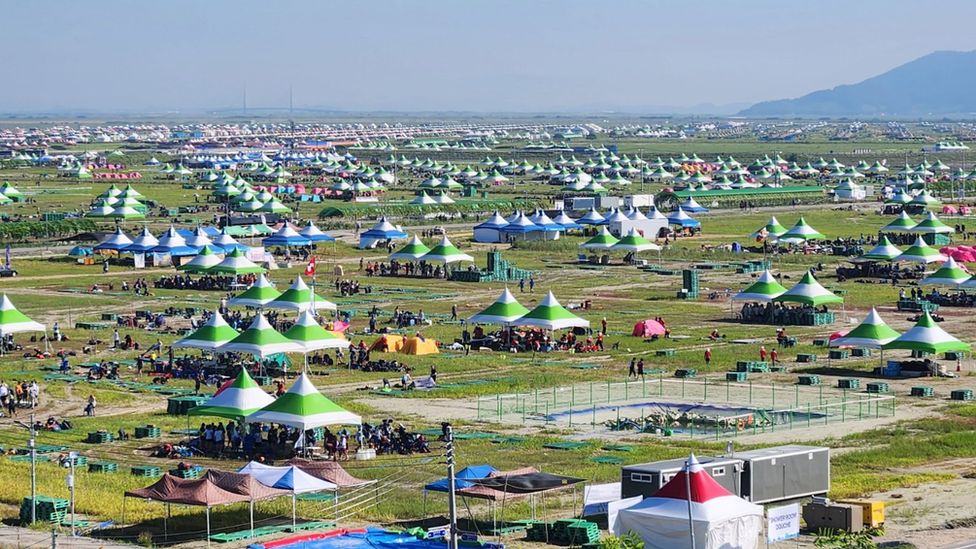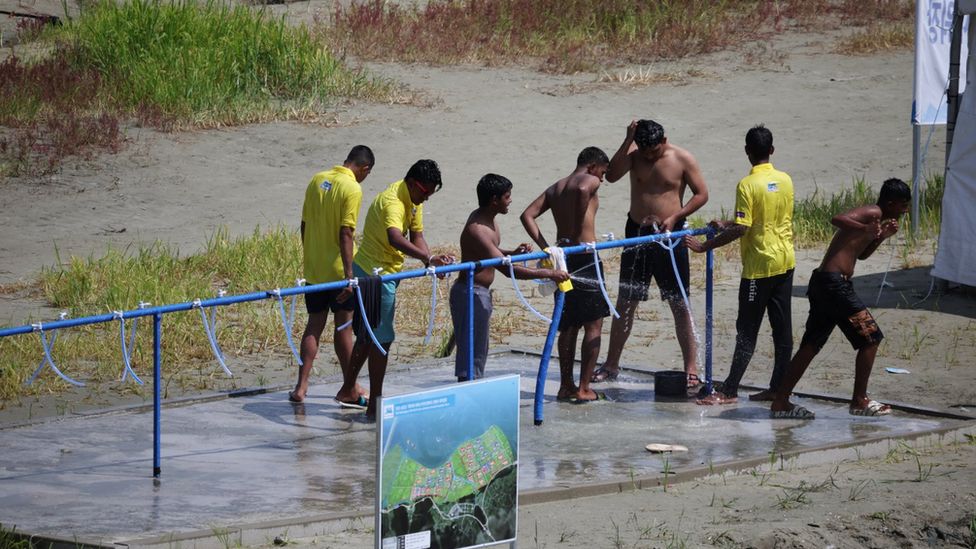



Organisers have been forced to evacuate all participants from the Saemangeum campsite
Complaints were followed by accusations of lack of preparation by the organisers.
Described as the world's largest youth camp, the jamboree - or festival - gathers young Scouts from around the world every four years.
About 43,000 participants - mainly scouts aged 14-18 - gathered on 1 August for the 12-day event on South Korea's western coast.
But campsite problems led to contingents pulling out. On Monday, an incoming typhoon which turned into a tropical storm forced organisers to call quits and evacuate all participants from the Saemangeum area - a vast, treeless flatland.
Scout groups are now scattered at sites across the country, including hundreds of kilometres north in the capital Seoul.
But the jamboree's problems began long before the storm.
In the week preceding the event, heavy rainfall turned the campsite into a muddy swamp and breeding ground for mosquitoes and flies.
Days later, a heatwave shot temperatures up to 35C (95F) as the event began. About 400 cases of heat exhaustion were reported on the first night - with many people having to be treated at a makeshift hospital on the baking grounds. A Covid-19 outbreak also spread to about 70 campers.
The South Korean organising committee deployed additional medical staffers to the event, and provided more shade and air conditioners on site, but it wasn't enough, campers said.
Participants complained about poor sanitation, rotten food, a lack of shelter and privacy.
A parent of a child in the UK contingent at the Jamboree said: "My child arrived on site to be tasked immediately with digging drainage ditches. It is blatantly obvious that the site was in no fit state to hold this event.
"The toilet facilities were disgusting, filthy and not working. There were insufficient showers with my child's contingent resorting to showering outside under the water filling point. There was insufficient food available with no vegetarian options."
A man from the Thai delegation was also caught walking into the female shower facility. He said it was an accident, and that he had not seen a sign designating gender. After the incident, all 85 South Korean scouts and leaders withdrew from the jamboree, saying organisers did not do enough to protect women.
The organisers said they had concluded the incident was an accident, but are continuing investigations. They did not address the scouts' concerns about the lack of measures to protect women.

Participants hosing themselves off to stay cool at the site during the heatwave
By the end of the week, the UK and US contingents had pulled their thousands of scouts out of the campsite. They were followed by other countries including Singapore and New Zealand.
And on Tuesday, everyone else was evacuated from the Saemangeum site after South Korean authorities conceded it was no longer safe to run the event given the approaching storm.
Thousands of participants and volunteers were ferried out of the campsite in a convoy of more than 1,000 buses to other locations around South Korea. On Wednesday, one of the buses carrying the Swiss contingent crashed, injuring three members who had to be taken to hospital.
Despite the evacuation from its main camp site, organisers say the jamboree, scheduled to continue to 12 August, will roll on with tours and education programmes in the new sites around the country where the scouts have been taken.
South Korea's culture ministry also announced on Tuesday that a closing ceremony will be held at the end of the week at the Seoul World Cup Stadium, along with a K-pop concert.
A spokesman from the New Zealand contingent told the BBC it had taken their team years to raise funds for the event, and the adult volunteers were "determined to make this a positive experience" despite the challenges.
But the post-event autopsy has already begun. Some critics before the event - including local politicians - raised concerns about gathering so many people at a site that lacked natural protection from the heat.
A senior South Korean official, who was called in to the site last week, told the BBC he believed a key reason for the mess was the number of authorities involved.
"We dispatched some workers to the site, and there were reports that they couldn't even have lunch. There were piles of lunch boxes prepared, but there was nobody to distribute it," he told the BBC. He declined to be named as he said he was not authorised to speak to media.
On top of the Korea Scout Association, the project was also managed by the province's officials, South Korea's legislature, as well as three other government agencies including the ministry of gender equality and family, the ministry of tourism, and the ministry of interior and safety.
Logistical errors persist, Korean media reports. For example, officials in one district prepared food and accommodation for 175 evacuated scouts of the Yemen contingent. But it turned out the scouts had not even attended the jamboree in the first place.
"This is the first time in more than 100 years of World Scout Jamborees that we have had to face such compounded challenges, from untimely floods to an unprecedented heatwave and now a typhoon!" said Ahmad Alhendawi, the Secretary-General of the World Organization of the Scout Movement, in a statement.
Natural disasters - like the typhoon - are an unforeseen calamity. The last time a typhoon had disrupted the event was at the 1971 jamboree held in Japan, a spokesman from the Scouts told the BBC.
But South Korean authorities will also be sifting through accusations of mismanagement after six years of preparation.
The jamboree is a major event. Countries bid to host the festival each time, and in 2017, South Korea won that right.
Local authorities had hoped the first world jamboree to held since the pandemic would bring in investment and tourist dollars. It was to be seen as the country's largest undertaking in terms of international participants since the 2018 Pyeongchang Winter Olympics.
However, the event's troubles have instead led to Korean media calling the event "a national disgrace."
-- Courtesy of BBC News